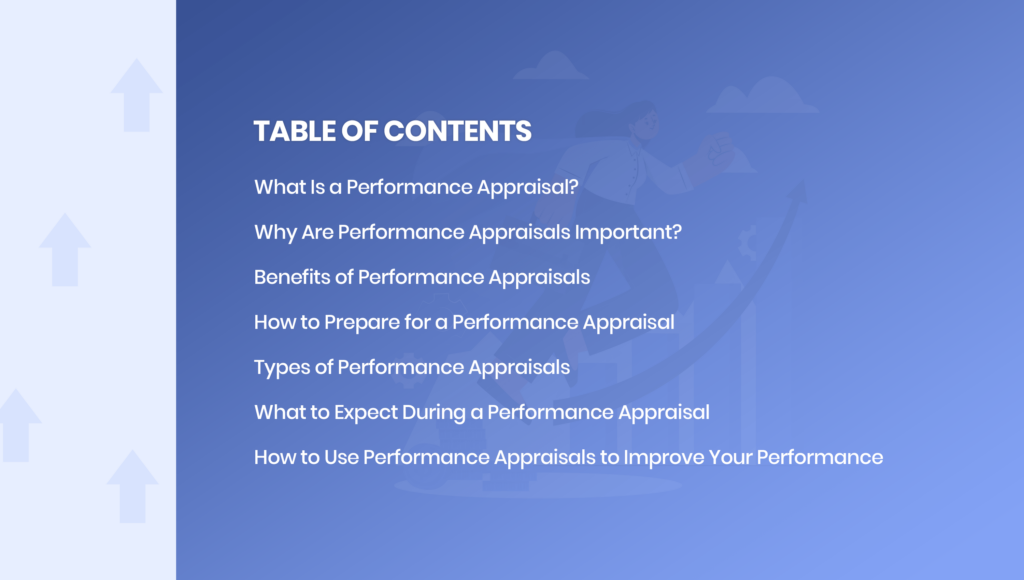Performance appraisals are a crucial tool for organizations to evaluate employee contributions, foster professional growth, and drive organizational success.
This comprehensive article delves into the world of performance appraisals, exploring their significance, benefits, and effective implementation strategies.

What Is a Performance Appraisal?
A performance appraisal, also known as an employee performance appraisal, performance review, performance evaluation, or development discussion, is a systematic process of evaluating an employee’s job performance and overall contribution to an organization.
Why Are Performance Appraisals Important?
Performance appraisals hold immense value for both organizations and their employees. For organizations, they serve as a tool to:
Measure employee performance:
Accurately gauge individual contributions to the company’s overall success.
Identify areas for improvement:
Recognize strengths and weaknesses, allowing for targeted development plans.
Promote employee engagement:
Foster open communication, boost morale, and enhance employee satisfaction.
Make informed decisions:
Guide salary increases, promotions, and training opportunities based on performance.
For employees, performance appraisals provide:
Regular feedback:
Gain insights into their performance, strengths, and areas for improvement.
Goal setting:
Collaboratively establish clear and achievable performance goals.
Career development:
Identify opportunities for professional growth and skill enhancement.
Recognition and appreciation:
Receive acknowledgment for their contributions and hard work.
Benefits of Performance Appraisals
The benefits of performance appraisals extend beyond individual employees and permeate the entire organization. They contribute to:
Enhanced productivity: Improved employee performance leads to increased productivity and efficiency.
Reduced turnover: Engaged and satisfied employees are less likely to seek employment elsewhere.
Stronger team dynamics: Open communication and collaboration foster positive team dynamics.
Improved decision-making: Data-driven performance evaluations guide informed decisions.
Aligning individual goals with organizational goals: Performance appraisals ensure that individual goals align with the company’s overall objectives.
How to Prepare for a Performance Appraisal
Preparation is key to a successful performance appraisal. Here are some steps to ensure you are well-prepared:
Review your job description: Familiarize yourself with your responsibilities and performance expectations.
Gather evidence of your accomplishments: Keep track of your achievements, projects completed, and positive feedback received.
Reflect on your performance: Identify areas where you excelled and areas where you could improve.
Prepare questions: Formulate questions for your manager regarding performance expectations, career development opportunities, and any concerns you may have.
Types of Performance Appraisals
Performance appraisals can vary in format and frequency depending on the organization and industry. Some common types include:
Annual appraisals: Conducted once a year, providing a comprehensive review of employee performance.
360-degree appraisals: Gather feedback from multiple sources, including managers, peers, and subordinates.
Self-appraisals: Employees evaluate their own performance, providing a personal perspective.
Continuous appraisals: Ongoing feedback and performance discussions throughout the year.
What to Expect During a Performance Appraisal
A performance appraisal typically involves the following steps:
Opening: The manager initiates the discussion and sets the agenda.
Self-assessment: The employee presents their self-evaluation, highlighting accomplishments and areas for improvement.
Manager’s feedback: The manager provides feedback on the employee’s performance, addressing strengths, weaknesses, and potential areas for growth.
Goal setting: Collaborative goal setting for the next review period.
Closing: The manager summarizes the key takeaways and outlines the next steps.
How to Use Performance Appraisals to Improve Your Performance
Performance appraisals are not just about evaluating past performance; they are also catalysts for future growth. Here are some ways to use them effectively:
Embrace feedback: Be open to constructive criticism and identify areas where you can genuinely improve.
Set SMART goals: Establish Specific, Measurable, Achievable, Relevant, and Time-bound goals to track your progress.
Seek guidance and support: Collaborate with your manager to develop a plan for achieving your goals.
Take ownership: Proactively address areas for improvement and demonstrate your commitment to growth.
Conclusion
Performance appraisals are valuable tools that can benefit both organizations and their employees. By conducting regular appraisals, organizations can foster a culture of continuous improvement, enhance employee engagement, and achieve their overall goals.
Employees, in turn, gain valuable feedback, identify areas for growth, and set goals to advance their careers. When used effectively, performance appraisals can transform employee performance and contribute to the overall success of the organization.

